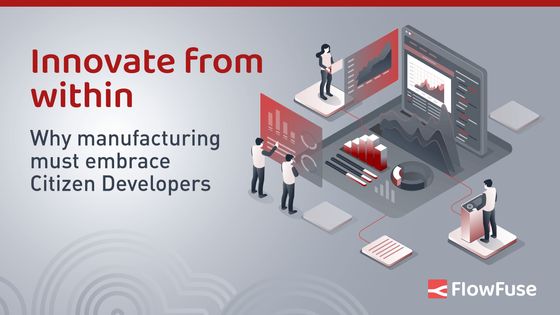Innovate from within - Why manufacturing must embrace Citizen Developers
Empower your Operational Technology teams as Citizen Developers

In the early days when I was working as a solution architect, I found myself in a peculiar position, observing an intriguing relationship between Operational Technology (OT) and Information Technology (IT) departments. While OT departments struggled to develop digital solutions, the IT departments held an unspoken authority in this domain, leading to a paradoxical dynamic that often seemed to hinder rather than facilitate progress.
As a solution architect working within this environment, I found myself uniquely positioned to bridge the gap between these two groups while also helping them find common ground on which they could build successful projects together. To do so effectively, I needed to understand each group's perspective and determine how best they could collaborate without compromising either side's autonomy or objectives. This task was not always easy but ultimately proved rewarding once achieved successfully.
# A Tale of Shadow IT
In the best-case scenarios, IT departments considered themselves as vendors, and OT, the customers. However, the IT-driven, off-the-shelf solutions seldom proved to be the right fit for the problems at hand. This mismatch often led to the birth of shadow IT systems—solutions that were not sanctioned by IT, yet were deemed necessary to maintain operational efficiency. In this realm of shadow IT, I've observed countless solutions running on desktop PCs, hidden from the eyes of IT departments, solving problems in manufacturing quickly—a situation born of necessity, with which no one could be satisfied. I cannot deny that Node-RED, an open-source low-code programming tool, has very often been one of these shadow IT systems, enabling data modification, lightweight HMI creation, and empowering the OT workforce.
However, this under-the-radar approach is fraught with dangers. With unprotected systems and without official oversight, the potential for security breaches is a real and present danger. I would wager that even today, a simple scan on port 1880 would reveal a multitude of open Node-RED environments. This double-edged sword of innovation and insecurity highlights the urgent need for a paradigm shift.
# Why are Citizen Developers Important in Manufacturing?
Citizen developers are individuals who create applications and software solutions for their organizations without any background in computer programming. These citizen developers leverage low-code platforms to build apps that automate tasks, streamline processes, and improve existing systems' user experiences. Citizen developers are a growing trend in the industry, serving as a key factor in harmonizing IT and OT interests. They bring an array of benefits that can make businesses more efficient and cost-effective. From reducing development costs to increasing productivity, citizen developers offer significant value to organizations seeking ways to stay competitive.
-
Acceleration of Software Development: Low-code platforms significantly expedite the software development process, enabling more efficient realization of business requirements. By quickening development, these platforms free up time and resources for design and innovation, leading to higher-quality software that better serves the business's needs.
-
Crafting Bespoke Applications: By empowering non-professional coders with the right tools and resources, organizations can democratize digital solutions. This not only facilitates the creation of custom systems that fit seamlessly into existing infrastructures but also enables rapid ideation and development, even for those without prior coding experience.
-
Enhancement of Operational Processes and Customer Experiences: With the automation capabilities of low-code platforms and the innovative solutions generated by citizen developers, operational processes can be optimized, and customer experiences significantly improved. The synergy between these elements can lead to efficiency gains through automation and the delivery of more effective, customer-centric solutions.
This shift toward embracing citizen development within manufacturing represents a unique opportunity where both sides benefit significantly; not only do OT departments gain access to custom applications tailored precisely for their needs, but IT teams can lead guidance for self-empowerment, resulting in greater efficiency through automation.
# Democratize Application Development with Node-RED
For the past decade, Node-RED has been a pioneer in low-code tools, democratizing application development in manufacturing. It provides powerful data collection, transformation, and visualization capabilities, simplifying the application-building process. As an open-source tool with no associated costs or licensing fees, Node-RED is increasingly popular among manufacturers seeking to quickly develop custom applications without extensive coding knowledge or experience. FlowFuse takes things one step further, offering organizations a way to officially incorporate and scale Node-RED, making it compliant, governed, and secure within the existing solution landscape.
# The Strategic Imperative of Citizen Development
For industry decision-makers, this is a call to action. It is imperative to nurture this growing community within your workforce, providing them with the tools, platforms, and, importantly, the organizational support they require. The empowerment of citizen developers could very well be the deciding factor in your organization's ability to stay competitive, agile, and innovative in a rapidly evolving market.
Looking to the future, the success of modern manufacturing lies in its people and their ability to solve problems with the right tools at their fingertips. Citizen development has the potential to break down the barriers. Organizations that recognize and invest in this potential will undoubtedly lead the charge.
Written By:
Published on:
Related Articles:
- Citizen Development: Unleashing Domain Experts
- New Charts Available in FlowFuse Dashboard
- Evolution of Technology: Impact on Job Roles and Companies
- Building on FlowFuse: Remote Device Monitoring
- Deploying FlowFuse with Docker on an Ubuntu server